

Eurasian Economic Community customs union. United States foreign policy opposes the Customs Union, claiming it as an attempt to "reestablish a Russian-dominated USSR-type union amongst the Post-Soviet states".[9] Market access[edit] Nominal World GDP and GDP of Customs Union of Belarus, Kazakhstan and Russia in 2011.
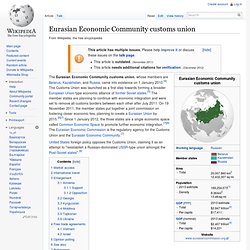
China: $7.2 trillion (10%) Japan: $5.8 trillion (8%) Other countries: $22.2 trillion (32%) Pacific Islands Forum. The Pacific Islands Forum is an inter-governmental organization that aims to enhance cooperation between the independent countries of the Pacific Ocean.
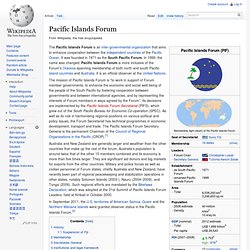
It was founded in 1971 as the South Pacific Forum. In 1999, the name was changed; Pacific Islands Forum is more inclusive of the Forum's Oceania-spanning membership of both north and south Pacific island countries and Australia. It is an official observer at the United Nations. North American Free Trade Agreement. NAFTA GDP - 2012 : IMF - World Economic Outlook Databases (Oct 2013) The North American Free Trade Agreement (NAFTA; French: Accord de libre-échange nord-américain, ALÉNA; Spanish: Tratado de Libre Comercio de América del Norte, TLCAN) is an agreement signed by Canada, Mexico, and the United States, creating a trilateral rules-based trade bloc in North America.
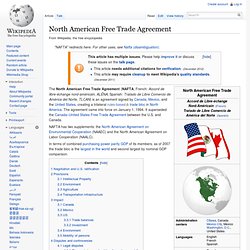
The agreement came into force on January 1, 1994. It superseded the Canada–United States Free Trade Agreement between the U.S. and Canada. Arab League. The Arab League (Arabic: الجامعة العربية al-Jāmiʻa al-ʻArabiyya) (formally, the League of Arab States (Arabic: جامعة الدول العربية Jāmiʻat ad-Duwal al-ʻArabiyya)) is a regional organization of Arab countries in and around North Africa, the Horn of Africa, and Southwest Asia.
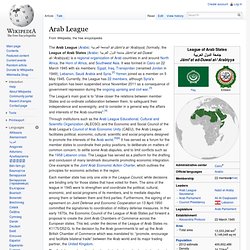
It was formed in Cairo on 22 March 1945 with six members: Egypt, Iraq, Transjordan (renamed Jordan in 1949), Lebanon, Saudi Arabia and Syria.[2] Yemen joined as a member on 5 May 1945. Currently, the League has 22 members, although Syria's participation has been suspended since November 2011 as a consequence of government repression during the ongoing uprising and civil war.[3] Economic Cooperation Organization. The Economic Cooperation Organization (ECO) is an intergovernmental organization involving seven Asian and three Eurasian nations, part of the South-central Asian Union.
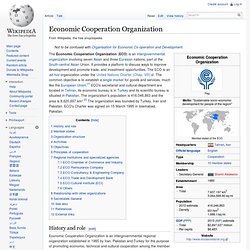
It provides a platform to discuss ways to improve development and promote trade, and investment opportunities. The ECO is an ad hoc organization under the United Nations Charter (Chap. VIII). The common objective is to establish a single market for goods and services, much like the European Union.[1] ECO's secretariat and cultural department are located in Tehran, its economic bureau is in Turkey and its scientific bureau is situated in Pakistan. Turkic Council. History[edit] For centuries, Turks shaped global history in their own particular way.
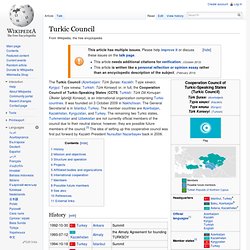
They built and ruled numerous empires and states in the vast area stretching from Europe to India and from the Pacific to Egypt and Maghreb. Union State. The Union State (Russian: Союзное государство; Belarusian: Саюзная дзяржава), semi-officially known as Union State of Russia and Belarus (Russian: Союзное государство России и Беларуси; Belarusian: Саюзная дзяржава Расіі і Беларусі), is a supranational entity consisting of the Russian Federation and the Republic of Belarus.
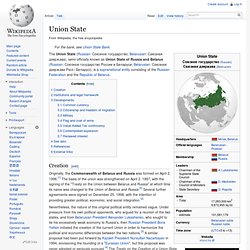
Union of South American Nations. The Union of South American Nations (USAN; Dutch: Unie van Zuid-Amerikaanse Naties ( pronunciation ), UZAN; Portuguese: União de Nações Sul-Americanas, UNASUL; Spanish: Unión de Naciones Suramericanas, UNASUR) is an intergovernmental union integrating two existing customs unions – Mercosur and the Andean Community of Nations (CAN) – as part of a continuing process of South American integration.
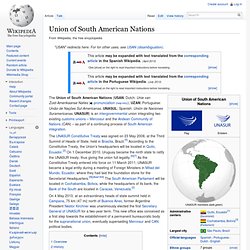
On 4 May 2010, at an extraordinary heads of state summit held in Campana, 75 km (47 mi) north of Buenos Aires, former Argentine President Néstor Kirchner was unanimously elected the first Secretary General of UNASUR for a two-year term. This new office was conceived as a first step towards the establishment of a permanent bureaucratic body for the supranational union, eventually superseding Mercosur and CAN political bodies. Overview[edit] South Asian Association for Regional Cooperation. The South Asian Association for Regional Cooperation (SAARC) is an economic and geopolitical cooperation among eight member nations that are primarily located in South Asia continent.[10] Its secretariat is headquartered in Kathmandu, Nepal.[11]
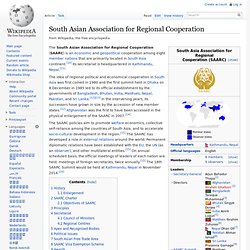
Eurasian Economic Community. The Eurasian Economic Community (EAEC or EurAsEC) originated from the Commonwealth of Independent States (CIS) Customs Union of Belarus, Kazakhstan and Russia on 29 March 1996.[1] The Treaty on the establishment of the Eurasian Economic Community was signed on 10 October 2000,[2] in Kazakhstan's capital Astana by Presidents Alexander Lukashenko of Belarus, Nursultan Nazarbayev of Kazakhstan, Askar Akayev of Kyrgyzstan, Vladimir Putin of Russia, and Emomali Rakhmonov of Tajikistan.
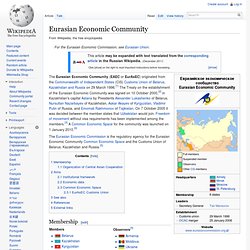
On 7 October 2005 it was decided between the member states that Uzbekistan would join. Freedom of movement without visa requirements has been implemented among the members.[3] A Common Economic Space for the community was launched on 1 January 2010.[4] Membership[edit] Organization of Central Asian Cooperation[edit] On 28 February 2002, it was renamed to its current name. Aims[edit] Institutional framework[edit]
Cooperation Council for the Arab States of the Gulf. The Cooperation Council for the Arab States of the Gulf (Arabic: مجلس التعاون لدول الخليج العربية), originally (and still) known as the Gulf Cooperation Council (GCC, مجلس التعاون الخليجي), is a political and economic union of Arab states bordering the Persian Gulf, namely Bahrain, Kuwait, Oman, Qatar, Saudi Arabia, and the United Arab Emirates.[1][2] Founding[edit] Established in Abu Dhabi on 25 May 1981,[8][9] the original union comprised the 630-million-acre (2,500,000 km2) Persian Gulf states of Bahrain, Kuwait, Oman, Qatar, Saudi Arabia and the United Arab Emirates.
The unified economic agreement between the countries of the Gulf Cooperation Council was signed on 11 November 1981 in Abu Dhabi. These countries are often referred to as "the GCC states". Central American Integration System. The Central American Integration System (Spanish: Sistema de la Integración Centroamericana, or SICA) is the economic and political organization of Central American states since February 1, 1993. On December 13, 1991 the ODECA countries (Spanish: Organización de Estados Centroamericanos) signed the Protocol of Tegucigalpa, extending earlier cooperation for regional peace, political freedom, democracy and economic development. SICA's General Secretariat is in El Salvador. In 1991, SICA's institutional framework included Guatemala, El Salvador, Honduras, Nicaragua, Costa Rica and Panama. Belize joined in 2000 as a full member, while the Dominican Republic became an associated state in 2004 and a full member in 2013.
Caribbean Community. Established in 1973, the Caribbean Community (CARICOM) is an organization of 15 Caribbean nations and dependencies. CARICOM's main purposes are to promote economic integration and cooperation among its members, to ensure that the benefits of integration are equitably shared, and to coordinate foreign policy.[2] Its major activities involve coordinating economic policies and development planning; devising and instituting special projects for the less-developed countries within its jurisdiction; operating as a regional single market for many of its members (Caricom Single Market); and handling regional trade disputes. Association of Southeast Asian Nations. The Association of Southeast Asian Nations[5] (ASEAN /ˈɑːsi.ɑːn/ AH-see-ahn,[6] /ˈɑːzi.ɑːn/ AH-zee-ahn)[7][8] is a political and economic organisation of ten countries located in Southeast Asia, which was formed on 8 August 1967 by Indonesia, Malaysia, the Philippines, Singapore and Thailand.[9] Since then, membership has expanded to include Brunei, Burma (Myanmar), Cambodia, Laos, and Vietnam.
Its aims include accelerating economic growth, social progress, sociocultural evolution among its members, protection of regional peace and stability, and opportunities for member countries to discuss differences peacefully.[10] ASEAN covers a land area of 4.46 million km², which is 3% of the total land area of Earth, and has a population of approximately 600 million people, which is 8.8% of the world's population. The sea area of ASEAN is about three times larger than its land counterpart. History[edit] African Union. The African Union (AU) is a union consisting of 54 African states. The only all-African state that is not a member is Morocco. The AU was established on 26 May 2001 in Addis Ababa and launched on 9 July 2002 in South Africa[7] to replace the Organisation of African Unity (OAU).